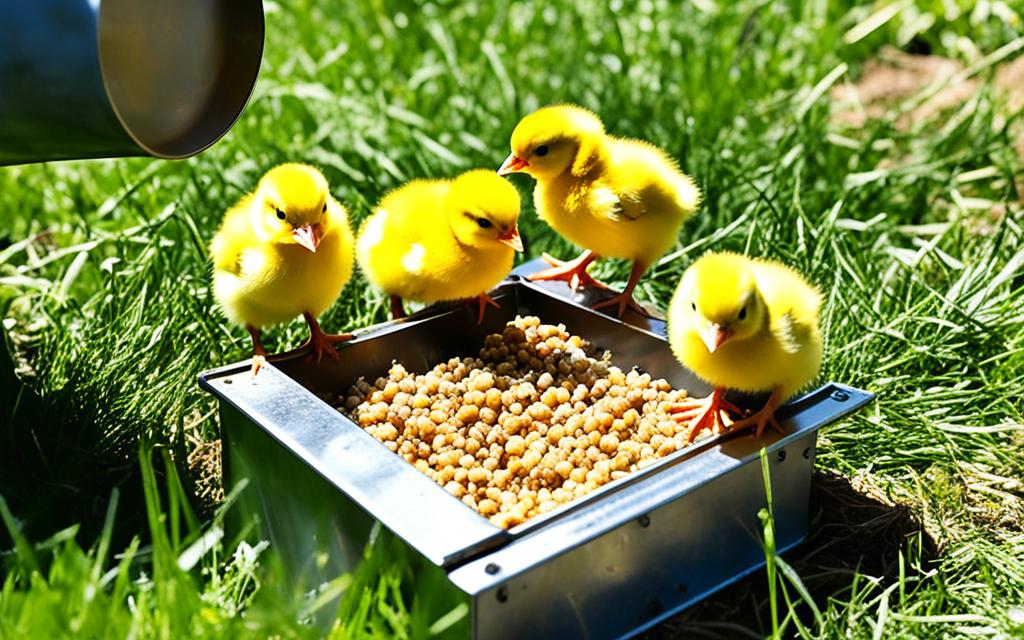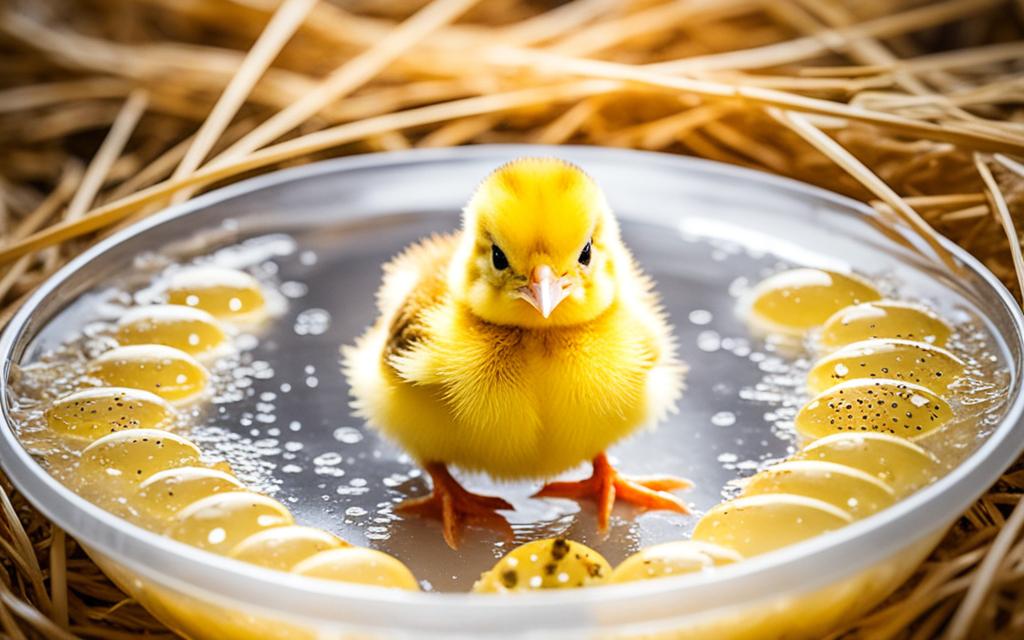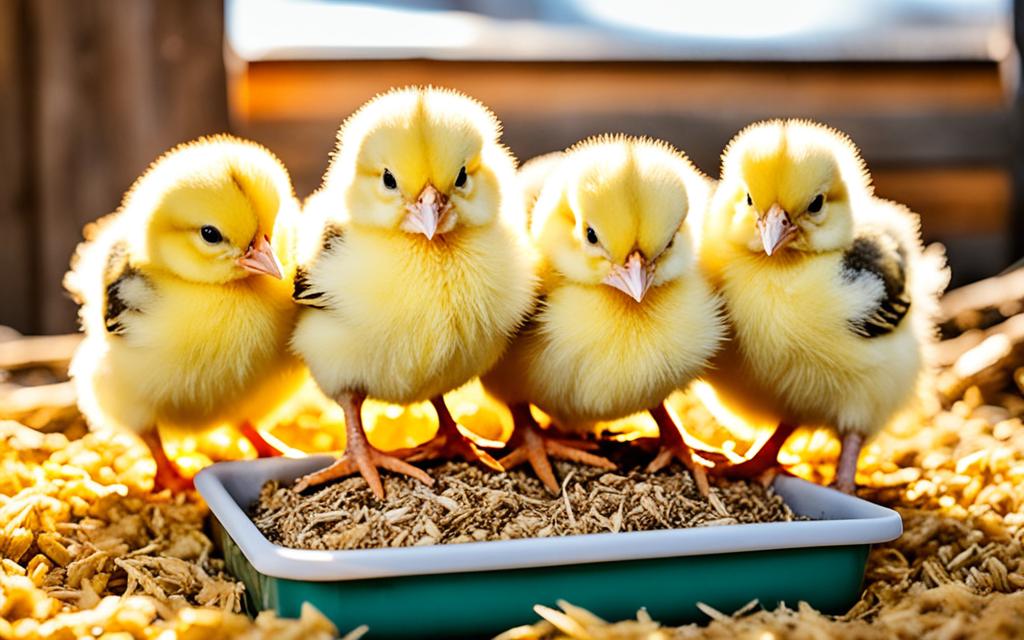Welcome to our comprehensive feeding guide for baby chicks! As a chicken parent, it’s important to understand the dietary needs of your adorable chicks to ensure they thrive and grow into healthy adult chickens. In this article, we will explore the essential nutrients required for their optimal health and provide you with valuable information on what to feed them during their early stages of development.
Key Takeaways:
- Understanding the nutritional needs of baby chicks is crucial for their proper growth and development.
- Choosing the right feed, such as chick starter feed, is vital for their well-being.
- Chick starter feed contains key ingredients and nutrients necessary for promoting healthy growth.
- Establishing a proper feeding schedule ensures your baby chicks receive the right amount of nutrition.
- Supplementing their diet with safe and beneficial foods can provide additional nutrition.
Understanding Baby Chick Nutrition
When it comes to raising healthy and happy baby chicks, nutrition plays a vital role in their growth and development. Baby chicks have unique dietary needs that differ from adult chickens, and providing them with the right nutrition is essential for their overall well-being.
Let’s explore the essential nutrients that baby chicks need to thrive and the importance of incorporating these nutrients into their diet:
Protein
Protein is a crucial component of a baby chick’s diet. It is essential for their muscle development, feather production, and overall growth. High-quality protein sources such as poultry meal, soybean meal, and insect-based protein are commonly found in chick starter feeds.
Carbohydrates
Carbohydrates provide energy to baby chicks and support their rapid growth. Many chick starter feeds contain grains like corn, wheat, and barley, which are excellent sources of carbohydrates. These grains are typically finely ground to ensure easy digestion for the chicks.
Vitamins and Minerals
Vitamins and minerals are essential for the healthy development of baby chicks. Chick starter feeds are formulated to provide essential vitamins like vitamin A, vitamin D, vitamin E, and B vitamins, along with minerals like calcium and phosphorus. These nutrients are crucial for bone development, immune system function, and overall vitality.
Healthy Fats
Healthy fats, such as those found in vegetable oils or animal fats, are important for baby chicks’ growth and the development of their nervous system. These fats provide a concentrated source of energy and help in the absorption of fat-soluble vitamins.
| Nutrient | Function | Sources |
|---|---|---|
| Protein | Muscle development, feather production, overall growth | Poultry meal, soybean meal, insect-based protein |
| Carbohydrates | Energy source, support rapid growth | Corn, wheat, barley |
| Vitamins and Minerals | Healthy development, immune system, bone development | Vitamin A, D, E, B vitamins, calcium, phosphorus |
| Healthy Fats | Growth, nervous system development | Vegetable oils, animal fats |
“Offering a well-balanced diet to your baby chicks is the key to their optimal growth and development. Ensuring that they receive adequate amounts of protein, carbohydrates, vitamins, minerals, and healthy fats will set them on the path to a healthy and productive life.”
By understanding the nutritional needs of baby chicks, you can confidently provide them with the necessary nutrients for their growth. Meeting their dietary requirements will promote their overall health and help them thrive in their early stages of life.
Next, let’s discuss how to choose the right feed for your baby chicks and ensure they receive the best nutrition possible.
Choosing the Right Feed for Baby Chicks
When it comes to raising baby chicks, choosing the right feed is crucial for their overall well-being and development. The right nutrition in their early stages of life sets a solid foundation for their future growth. One of the key factors to consider in their diet is the chick starter feed. This specially formulated feed provides the essential nutrients that baby chicks need for healthy growth and development.
So, what exactly is chick starter feed? It is a nutritionally balanced feed designed specifically for baby chicks. This feed is packed with the vital nutrients, proteins, vitamins, and minerals that promote optimal health and support their growing bodies. Its finely ground texture also makes it easier for the chicks to consume and digest.
When choosing the best chick starter feed for your flock, there are a few important factors to consider:
- Quality: Look for high-quality brands that prioritize the nutritional needs of baby chicks.
- Protein Content: Ensure that the feed has a suitable protein content, typically around 18-20%, to support their growth.
- Medication: Decide whether you want to use medicated or non-medicated feed. Medicated feed contains a preventive medication to protect against common poultry diseases, while non-medicated feed does not.
- Organic Options: If you prefer organic feeds, check for organic-certified options that meet your preferences.
It’s important to note that while chick starter feed is essential during their early stages, baby chicks will eventually transition to a diet of adult chicken feed as they mature. This transition usually happens around 8-10 weeks of age, depending on the breed and development rate of your chicks.
| Benefits of Chick Starter Feed | Nutrients Found in Chick Starter Feed |
|---|---|
|
|
Quote:
“Choosing the right feed for baby chicks is crucial for their overall health and development. The right nutrition sets the stage for a lifetime of well-being. Make sure to provide them with quality chick starter feed to promote optimal growth and give them the best start in life.” – Jane Smith, Poultry Expert
What Does Chick Starter Feed Contain?
Chick starter feed is specially formulated to provide baby chicks with the essential nutrients they need for healthy growth and development. Let’s take a closer look at the key ingredients and nutrients found in chick starter feed:
1. Protein
Protein is a crucial component of chick starter feed. It plays a vital role in muscle development, feather production, and overall growth. High-quality protein sources, such as soybean meal, fish meal, and dried whey, are commonly included in chick starter feed.
2. Vitamins
Vitamins are essential for the proper functioning of a chick’s body. Chick starter feed is typically fortified with vitamins, including vitamin A, vitamin D, and vitamin E, among others. These vitamins support immune health, bone development, and overall vitality.
3. Minerals
Minerals, such as calcium and phosphorus, are vital for strong bones and eggshell formation in growing chicks. Chick starter feed often contains a balanced mix of minerals to support skeletal development and overall health.
4. Carbohydrates
Carbohydrates provide the necessary energy for baby chicks’ daily activities. Corn and wheat are common sources of carbohydrates in chick starter feed, offering a readily available energy source for the growing chicks.
5. Probiotics
Probiotics are beneficial bacteria that support the chick’s digestive system. They help improve nutrient absorption and promote a healthy gut microbiome. Chick starter feed may contain probiotics to enhance digestion and overall gut health.
By providing a well-balanced combination of these essential nutrients, chick starter feed ensures that baby chicks receive the nourishment they need for optimal growth and development.
Remember, it’s important to provide fresh, clean water alongside the chick starter feed to keep your baby chicks hydrated and healthy.
Feeding Schedule for Baby Chicks
Establishing a proper feeding schedule is essential for the well-being of your baby chicks. By providing them with the right amount of nutrition at each stage of their growth, you’ll ensure their healthy development and future as thriving, egg-laying hens. In this section, we will outline a detailed feeding schedule to guide you in properly nourishing your fluffy flock.
Starter Feed
- Week 1: During their first week, feed your baby chicks a high-quality chick starter feed exclusively. This feed is specifically formulated to meet their nutritional needs and promote healthy growth.
- Week 2-4: In the following weeks, continue to provide them with chick starter feed. Ensure it constitutes the majority of their diet, allowing them to build strong bodies and immune systems.
Growth Feed
As your baby chicks progress, their nutritional requirements will change. At around 4-6 weeks, you can begin introducing a blend of chick starter feed and a grower ration to support their continued growth and development.
Maintenance Feed
Once your baby chicks reach 8-12 weeks of age, transition them to a maintenance feed suitable for young pullets. This feed will provide them with the necessary nutrients to support the development of their reproductive systems.
Supplementary Treats
While the primary source of nutrition for baby chicks is their feed, you can supplement their diet with nutritious treats to provide variety and enhance their overall well-being. Some recommended treats include:
- Fresh fruits and vegetables: Offer small, bite-sized pieces of fruits and vegetables such as apples, carrots, and leafy greens. These treats are rich in vitamins and minerals.
- Mealworms: These protein-packed snacks are a favorite among chickens and can be used as training treats or for mental stimulation.
- Yogurt: Plain, unsweetened yogurt is a great source of probiotics, which promote healthy digestion in baby chicks.
Remember, treats should only make up a small portion of their overall diet and should not replace their regular feed. Offer treats in moderation and ensure they have access to clean, fresh water at all times.
| Feeding Stage | Feed Type | Duration |
|---|---|---|
| Week 1 | Chick Starter Feed | 100% of diet |
| Week 2-4 | Chick Starter Feed | 75-100% of diet |
| 4-6 weeks | Chick Starter Feed + Grower Ration | 50% of each |
| 8-12 weeks | Maintenance Feed for Young Pullets | 100% of diet |

Follow this feeding schedule and nourish your baby chicks appropriately as they grow. By providing them with the right nutrition at each stage, you’ll ensure their healthy development and set a strong foundation for their future egg-laying endeavors.
Supplementing Baby Chick’s Diet
While chick starter feed is the mainstay of a baby chick’s diet, there are additional foods and supplements that can be introduced to their diet for added nutrition. It’s important to remember that these supplementary foods should be given in moderation and should not replace the chick starter feed, which provides the essential nutrients needed for healthy growth and development.
When considering what to feed baby chicks as supplements, it’s crucial to choose options that are safe and beneficial for their delicate digestive system. Providing a varied diet can help ensure that your growing chicks receive a well-rounded nutritional intake.
Safe and Nutritious Supplemental Foods for Baby Chicks
| Supplemental Food | Nutritional Benefits |
|---|---|
| Fresh Fruits and Vegetables | Provide vitamins, minerals, and antioxidants Help support a healthy immune system |
| Hard-Boiled Eggs | Rich in protein and essential amino acids Promote muscle development and feather growth |
| Yogurt | Contains probiotics for a healthy gut Aids in digestion and nutrient absorption |
| Mealworms | High in protein and fat Supports healthy growth and energy levels |
When introducing these supplemental foods, remember to provide them in small, bite-sized pieces to ensure easy consumption for your baby chicks. Additionally, ensure that the foods are fresh and clean, free from any contaminants that could harm your chicks’ health.
Remember, while it’s fun to give your fluffy flock treats, they should always be given in moderation. Too many treats can disrupt the balance of their diet and lead to nutrient deficiencies or digestive issues. Always prioritize the chick starter feed as the main source of nutrition for your baby chicks.
Keep in mind that as your baby chicks grow older, their nutritional needs will change. Consult with a poultry nutritionist or veterinarian for specific recommendations on how to adjust their diet as they transition into adult chickens.
Watering Tips for Baby Chicks
Adequate hydration is crucial for the health and well-being of your baby chicks. As they grow and develop, it’s important to ensure they have constant access to clean water. Here are some essential watering tips to help you raise healthy and happy baby chickens:
1. Provide Fresh and Clean Water
Make sure to provide fresh and clean water to your baby chicks at all times. Dirty or contaminated water can lead to health issues and dehydration. Regularly clean and refill their water containers to maintain good hygiene.
2. Use Suitable Water Containers
Choose water containers that are appropriate for baby chicks. Shallow and narrow containers are ideal, as they allow easy access for the chicks and minimize the risk of drowning. You can use small bowls, shallow dishes, or specialized chick waterers that are designed to prevent spills.
3. Keep Water Containers at the Right Height
Ensure that the water containers are at a suitable height for the baby chicks. They should be positioned at a height that allows the chicks to reach the water easily without straining. This helps them stay hydrated without causing discomfort or stress.
4. Monitor Water Consumption
Regularly monitor your baby chicks’ water consumption to ensure they are drinking enough. The exact amount of water each chick needs can vary, but a general guideline is to provide around 1/4 to 1/2 cup of water per chick per day. Adjust the quantity based on their needs and weather conditions.
5. Protect Water from Contamination
Prevent contamination of the water by keeping it away from their food and feces. Chickens have a habit of scratching and kicking up bedding material, so it’s essential to place the water containers in a clean and separate area. Protecting the water from debris and contaminants will reduce the risk of diseases.
6. Consider Adding Electrolytes and Vitamins
In certain situations, such as hot weather or periods of stress, you may consider adding electrolytes and vitamins to the chicks’ water. These supplements can help replenish essential nutrients and promote hydration. However, always consult with a poultry expert or veterinarian before adding any supplements to their water.

Remember, providing adequate hydration is vital for the health and growth of your baby chicks. By following these watering tips, you’ll ensure that they are well-nourished and thriving. Now that you know how to keep their thirst quenched, let’s explore the next section on transitioning them to adult chicken feed.
Transitioning to Adult Chicken Feed
Watching your baby chicks grow is a joyous experience, but it won’t be long before they outgrow their diet of chick feed. As your fluffy little friends mature, it’s essential to transition them to a balanced adult chicken feed to support their ongoing development.
But how do you know when it’s the right time to make this transition? And what steps should you take to ensure a smooth change in their diet?
Let’s explore the signs that indicate your baby chicks are ready to graduate from chick feed and delve into the best practices for introducing adult chicken feed to your flock.
One key indicator that your baby chicks are ready for a diet change is their age. Generally, transitioning to adult chicken feed should occur when the chicks are around 16-20 weeks old. At this stage, they have developed enough to handle the higher protein content and other essential nutrients found in adult feed.
Additionally, observing the behavior and physical attributes of your chicks can offer valuable insights into their readiness for the transition. Look out for the following signs:
- Feather development: If your chicks have fully feathered out and sport their adult plumage, it’s a good indication that they are ready for the switch.
- Increased appetite: Growing baby chicks will naturally develop a healthy appetite. If you notice that they are consuming large quantities of chick feed and still seem hungry, it may be a sign that they need the additional nutrition provided by adult chicken feed.
- Sustained growth: Baby chicks go through rapid growth stages in their early weeks. However, if you observe that their growth rate has slowed down or plateaued, it may be a sign that their current diet is no longer sufficient to support their development.
When it comes to introducing adult chicken feed, gradual transition is key. Abruptly switching from chick feed to adult feed can cause digestive issues for your chicks. Instead, follow these steps to smoothly transition their diet:
- Mixing ratio: Begin by gradually introducing small amounts of adult chicken feed into their chick feed. Start with a ratio of 75% chick feed and 25% adult feed for a week, then progress to a 50/50 ratio for the second week, and so on.
- Monitor and adjust: Observe your chicks closely during the transition period. If you notice any signs of digestive upset or reluctance to eat, adjust the ratio accordingly, giving them more time to adjust to the new feed.
- Complete transition: After a gradual transition period of about two to three weeks, your chicks should be fully adjusted to adult chicken feed. At this point, you can offer them a diet consisting solely of adult feed.
Remember to have a continuous supply of fresh water available for your chickens as they adapt to their new diet. Proper hydration is essential for their overall health and digestion.
By paying attention to the signs and following a gradual transition process, you can ensure a smooth switch to adult chicken feed for your growing chicks. Providing them with the right nutrition as they mature will support their ongoing health and well-being as they become fully-fledged members of your flock.
Conclusion
As you embark on your journey as a proud chicken parent, understanding the nutritional needs of your baby chicks is vital for their growth and well-being. Our comprehensive chick feeding guide has provided valuable insights into chick nutrition, ensuring that you have the knowledge to provide your fluffy flock with the best care possible.
By following the guidelines outlined in this feeding guide, you’ll be able to offer your baby chicks a balanced and nutritious diet that supports optimal growth and development. From the importance of chick starter feed to establishing a proper feeding schedule, these practices will lay the foundation for a healthy and happy life for your chicks.
Remember, chick nutrition is the key to raising thriving chickens. So, whether you’re offering them the right feed, supplementing their diet with nutritious treats, or ensuring they have access to clean water, your efforts will contribute to their overall well-being. As your chicks grow, you’ll eventually transition them to adult chicken feed, ensuring they continue to receive the nutrients they need to thrive.
Thank you for choosing our chick feeding guide as your trusted resource. We hope that it has equipped you with the knowledge and confidence to provide your baby chicks with the care they deserve. May your fluffy flock bring you endless joy and delight as they flourish under your nurturing care.
FAQ
What do baby chicks eat?
Baby chicks primarily eat chick starter feed, which is specially formulated to meet their nutritional needs. Chick starter feed contains a balanced mix of proteins, vitamins, and minerals necessary for their growth and development.
What is included in a baby chick’s diet?
In addition to chick starter feed, baby chicks can also consume fresh vegetables, fruits, and small amounts of grains. It’s important to introduce these foods gradually and ensure they are suitable for their age and size.
How often should I feed my baby chicks?
Baby chicks should have access to fresh chick starter feed at all times. They have small stomachs and need to eat frequently throughout the day, so keep their feeders stocked and monitor their intake.
Can I give my baby chicks treats?
Yes, you can give your baby chicks treats occasionally, but make sure they are safe and appropriate for their age. Avoid feeding them sugary or salty foods and focus on providing nutritious options like scrambled eggs or mealworms in moderation.
How long should I feed my baby chicks chick starter feed?
Baby chicks should be fed chick starter feed for at least 6-8 weeks or until they reach maturity. At that point, you can gradually switch them to a diet of adult chicken feed.
How much water should baby chicks drink?
Baby chicks should have access to clean, fresh water at all times. Monitor their water source to ensure it’s not contaminated, and make sure their waterers are at an appropriate height for their size.
When can I start giving my baby chicks grit?
Baby chicks can start consuming grit, which aids in digestion, as early as one week of age. However, only provide finely ground grit suitable for their small size.
Can baby chicks eat table scraps from my kitchen?
It is generally not recommended to feed baby chicks table scraps from your kitchen. These scraps may contain harmful ingredients or be unbalanced in terms of nutrition. Stick to a well-balanced diet of chick starter feed and appropriate treats.
How can I prevent my baby chicks from choking?
To prevent choking, make sure the size of any food or treats you give your baby chicks is appropriate for their age and size. Cut or break food into small pieces and supervise their consumption to ensure they don’t have any difficulties while eating.
Can baby chicks eat grass and bugs?
Baby chicks can consume small amounts of fresh grass and bugs once they are a few weeks old. However, make sure the grass is free from pesticides or chemicals, and ensure the bugs are safe and not harmful to your chicks.








